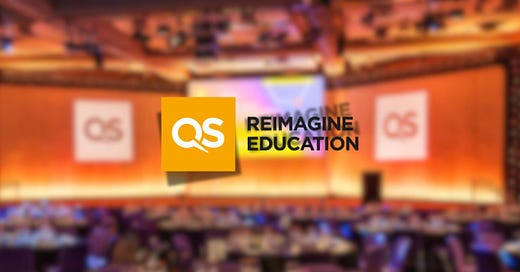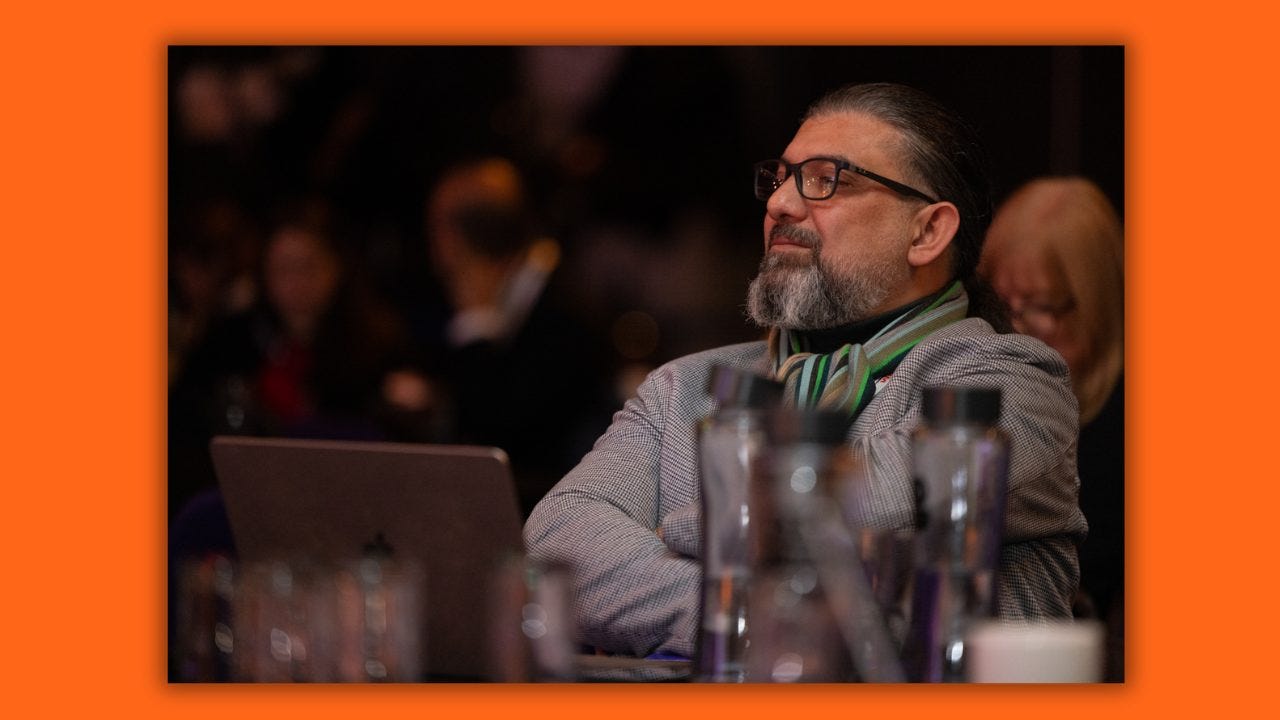On QS Reimagine Education Awards & Conference
This Is A Personal Account of My Participation at QS Reimagine Education 2024 - London
The Beginning of the Journey
Arriving in London on December 8th for the QS Reimagine Education Awards & Conference 2024, I felt a mix of anticipation and introspection. The city welcomed me with sharp, brisk winds that mirrored the intensity of the conversations about to unfold. My journey to this moment was anything but straightforward—a canceled flight and an unexpected rerouting through Charles de Gaulle tested my resolve. Yet, as I stepped into the heart of London, I knew I was ready to represent the Institute for Social Sciences and Humanities (ISSH) on this global stage.
This moment in London comes at a critical juncture. The Middle East is on the brink of transformation following a historic event: the end of Assad’s family dictatorship after half a century. The region’s future is fragile, with doubts about freedom, peace, and stability.
I followed the news the day before and couldn’t sleep that night. I wrote to my friend, not realizing that less than 24 hours later, everything would be turned upside down. I would like to share that message with all my Arab friends:
In such a context, education emerges as an essential force—a means of equipping people with the tools to navigate uncertainty, rebuild societies, and unlock their potential. I think of the thousands in the diaspora and at home who have been deprived of education and of how initiatives like ISSH can serve as a beacon for those seeking pathways to growth and understanding.
With ISSH’s Endowment Project now actively seeking visionaries and partners, there is a real opportunity to make this movement sustainable. This endowment isn’t just about financial support—it’s about building a legacy and creating a structure that ensures ISSH’s impact can expand and endure. Reflecting on the past eight years, I see this as a natural evolution of our work, a way to invite others into the project and share in its potential to reshape education across the Middle East and beyond.
This report is not an official account of the conference but a personal reflection—a snapshot of where
stands today and where it might go tomorrow. The journey is ongoing, and this moment is just one of many in the more significant movement. As I continue to capture my thoughts and experiences from the conference, I hope this report offers a glimpse into what makes ISSH not just an institution but a vision for a different educational future.About QS Reimagine Education
The QS Reimagine Education Awards & Conference, founded by QS Quacquarelli Symonds and The Wharton School, is a global platform dedicated to recognizing innovation in education. Established to spotlight cutting-edge ideas and transformative practices, it brings together educators, policymakers, and technologists from around the world. The awards celebrate projects and initiatives that advance learning outcomes, foster inclusivity, and leverage technology to address educational challenges. With categories ranging from AI integration to sustainability, the conference serves as a nexus for collaboration, innovation, and visionary thinking in education (Source: QS Quacquarelli Symonds, Reimagine Education Overview).
ISSH (The Institute for Social Sciences & Humanities)
ISSH has been central to my professional and personal journey since 2017. What began as my experience as a student evolved into a multifaceted relationship encompassing roles like Educational Development Strategist, Project Manager, and educator. Our nomination for the Access, Diversity, and Inclusion Award, recognizing our initiative, A Free Educational Alternative: Online University for the Deprived, highlighted ISSH’s dedication to redefining education as a bridge for the historically excluded, fostering impactful and inclusive opportunities.
Back to the conference...
The conference showcased innovations reshaping the educational landscape. Yet, I couldn’t help but notice the lack of representation for Social Sciences and Humanities—disciplines essential for cultivating critical thinking and human connection. This omission reflects a broader tension in education today, where profitability (commodification of knowledge) often overshadows holistic solutions.
The guy who asked questions.
Beyond the sessions, the conference offered meaningful connections. Engaging with diverse voices reminded me of the transformative power of collaboration. First comes Gabriel from Yale (not because of Yale!), and then many more, including Peter (I enjoyed talking to him, his personality, openness, and more) and Jason Dsouza, a humble, motivated, enthusiastic person who shared his vision for educational opportunities in Africa, emphasizing the untapped potential in these regions. Angela Ziebell from Deakin University discussed her fascinating project on Indigenous science and cultural intelligence, which profoundly impacted me. I also met Rajiv Vaid Basaiawmoit, whose strategic games for master's education revolutionize students' engagement with complex concepts. I soon became known to some of them as “the guy who asks questions.”
At the QS Reimagine Education Awards & Conference 2024, I was referred to many times by people as “the guy who asks questions.” Isn’t this depressingly sad? Think about it! To stand out as “the guy who asks questions” at a conference called “Reimagining Education,” where near-to-no students are present!
Nic Newman introduced me to a treasure trove of data and insights at Emerge Education, while Maria Spies and Greg Marschall spoke about leveraging AI to enhance personalized learning. Zoya Zaitseva, an organizer and experiential learning expert, appreciated my comments on the absence of Social Sciences at the conference. Rich, a Canadian teacher and education futurist, highlighted the dire situation in Canada’s educational landscape and shared his advocacy for integrating arts into social entrepreneurship education.
Each conversation underscored the conference’s richness and diversity, inspiring me to rethink the possibilities in education.
I will write more about the conference and its topics in the future. Please don’t assume this essay is my ultimate reflection and feedback on the conference. It had much to offer and many issues to discuss.
Reflecting on this experience, I see education as a dynamic ecosystem—one capable of adapting to uncertainties, empowering societies to rebuild, and equipping individuals to unlock their fullest potential in transformative…
naaah...
That is very chatGPT-like...
I am very pessimistic about the future of the current education landscape. I also firmly believe in the necessity of a holistic transformation of the global education system. This transformation is inevitable.
More on that later.

A Provocative Thought Before You Go
Before closing this preface, I want to share a particularly striking observation. Meeting some leaders from the higher education sector, particularly those from business-focused universities, was both troubling and revealing. I likened their attitude to that of a proud king who has achieved much but is blinded by arrogance and resistant to change. Such a king stands firm, assuming his kingdom—however flawed—is invulnerable to the coming storm. When the inevitable revolution arrives, chaos ensues, primarily because of his refusal to adapt, his ignorance of the shifting tides, and his stubborn inaction. The parallels to these administrators were glaring. They spoke as if the current form of the university—rigid and hierarchical—would persist indefinitely, much like their argument that the survival of theater after the advent of motion pictures proves universities need not worry about future disruptions. This reasoning struck me as absurd—a shallow justification that ignored the depth of challenges facing education today. No one seemed genuinely interested in reimagining education or even considering what future or emerging universities might look like. Instead, the conversation clung to outdated notions of resilience without acknowledging the need for honest transformation. Their dismissal of the disruptive changes shaping education —from technology to societal demands—struck me as a mix of arrogance and denial.
While their confidence amused me, it also left me deeply concerned for the emerging “InBetweenian” institutions striving to redefine education in these turbulent times. These institutions face an uphill battle in a landscape dominated by entrenched, traditional systems. Their journey, though difficult, is necessary for education to evolve and remain relevant.
What's Next?
This preface marks the start of a series capturing my reflections and insights from the QS Reimagine Education Awards & Conference. Each installment will explore key themes and moments, offering a glimpse into the possibilities of a reimagined educational future—one that is anything but the status quo.
If you’ve made it this far, you’ve invested your valuable time in my writing, and for that, I am truly grateful. As a token of reciprocity, I’d be delighted if you could gift me a few words of your thoughts or reflections in the comments—they mean more than you might imagine.






